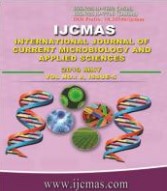


 National Academy of Agricultural Sciences (NAAS)
National Academy of Agricultural Sciences (NAAS)

|
PRINT ISSN : 2319-7692
Online ISSN : 2319-7706 Issues : 12 per year Publisher : Excellent Publishers Email : editorijcmas@gmail.com / submit@ijcmas.com Editor-in-chief: Dr.M.Prakash Index Copernicus ICV 2018: 95.39 NAAS RATING 2020: 5.38 |
Maize genotypes with effective tillers from a natural mutant with ineffective tillers are being developed at Central Research Institute for Dryland Agriculture, Hyderabad, India. Teosinte (Zea mays ssp. luxurians) and maize (Zea mays ssp. mays) cultivars - African tall (fodder maize) and harsha (composite) were included for development of CRIDA tillering maize. CRTM-2 had five effective tillers similar to teosinte, with a total height of 1223.5 cm, 62.0 leaves and 25.8 filled cobs for the single plant. CRTM-2 showed an increase of 530.3, 423.7 and 2086.0% over the varietal check/parent harsha while the increase was 388.0, 315.8 and 2350 % over check /parent African tall and increase was 15.5, 34.1 and -53.0 % over check/parent teosinte, for plant height, number of leaves and number of filled cobs respectively averaged over four seasons viz; 2016 (kharif and rabi), 2017 kharif and 2018 kharif. CRTM-2 had tillers like teosinte and the shape of cobs and seed type of Zea mays ssp. mays. Six SSR primers were employed for understanding the similarity between CRTM-2 and its parents. The dendrogram showed that CRTM-2 formed cluster with teosinte, African tall and harsha indicating that these are the parents which introgressed in the development of CRTM-2. This tillering maize can be source material for innovative concept of developing new tillering maize varieties with effective cobs and significantly higher productivity and production of feed, fodder and food for animals, poultry and humans apart from industrial uses.
 |
 |
 |
 |
 |